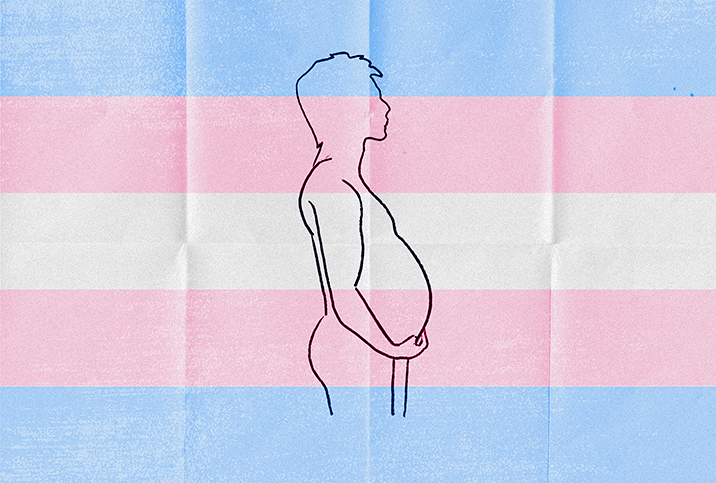Queering Menstruation: Periods Aren't Binary

Menstruation has historically been categorized as a "female" occurrence, even though not all people who menstruate are women, and not all women menstruate.
While menstruation is seldom a comfortable experience for anyone, for nonbinary individuals—an umbrella term for people whose gender is other than the traditional binary of male or female—discomfort can be further exacerbated in myriad ways, from doctor's visits to period product marketing.
The language used to describe menstruation is often gendered, including phrases such as lady times, womanly woes, Aunt Flo and "feminine" products.
Period products are for everyone
Menstruation depicted in commercials is rarely accurate, from the bright blue Windex-like liquid used to represent menstrual blood to featuring only cisgender women.
Mainstream commercials for menstrual products fail to depict a transgender or nonbinary experience of menstruation. In "Degendering Menstruation: Making Trans Menstruators Matter," author Klara Rydström posits that this cisnormativity creates a feeling of "othering" for anyone who menstruates that isn't cis.
Ryan, whose name has been changed to respect privacy, is a nonbinary, full-time student whose experiences with menstruation have heightened their gender dysphoria, or a sense of unease around the mismatch of gender identity and assigned sex at birth.
"I feel like seeing pink products, among other things, is the reason I feel so much discomfort and confusion getting my period," Ryan said.
The experience of menstruation
Consider the phrase "welcome to womanhood," where menstruation is often seen as the moment a girl magically metamorphoses into a woman. But for some people, starting to menstruate can initiate gendered experiences they don't align with, a monthly reminder of a gender they don't belong to or identify with.
It's crucial not to generalize the role that menstruation plays for all nonbinary people as menstruation and gender are highly variable based on the individual. Some menstruators do not suffer from their periods in direct relation to their gender identity, whereas others do, and some may experience indifference.
"Although I embrace the feminine parts of myself, I also have masculine parts which make it confusing and uncomfortable. I feel like it [menstruation] brings a lot of shame, embarrassment and confusion," Ryan said.
Bridging the gaps
Though menstruation is considered an essential marker of reproductive health, there's a significant gap in understanding the menstrual health needs of trans, nonbinary and intersex individuals.
A study published in 2021 in the journal Culture, Health & Sexuality sought to explore the lived experiences of AFAB (assigned female at birth) trans and nonbinary people alongside providers who serve trans and nonbinary populations.
The results suggested that public bathroom design was a hindrance: public stalls that typically have gaps between doors brought up feelings of unsafety for participants. The lack of disposable bins in individual stalls also created unease. Generally, there are no trash cans in the stalls of men's bathrooms, and participants noted a lack of unisex bathrooms as a barrier to safely caretaking menstruation.
Gender is also policed in social environments like public restrooms; many participants said they were more likely to be "policed" in the women's bathroom than in the men's and told they were using the wrong bathroom. You're a lot less likely to ask someone for a menstrual product when you are scared of being gender-policed, one of the participants noted.
Where providers miss the mark
The study also indicated a lack of healthcare provider competency, which manifested in using incorrect pronouns or disrespectful language with patients who were not cisgender. Queering menstruation education and understanding for providers and society at large is paramount.
Amy Wiser, M.D., and Connie Silverman, D.N.P., F.N.P., of Prism Health, a healthcare center in Portland, Oregon, that provides gender-affirming care, primary care, HIV and STI testing, and other services to the LGBTQIA+ community, offered a joint statement to Giddy. Historically, the conversation around periods has focused on cisgender women, which poses health implications, they said.
"There are lots of trans and nonbinary folks who do have uteruses, and we should be having conversations about what this means for their health," Wiser and Silverman said.
Patients may avoid seeking or continuing reproductive healthcare due to fear of discrimination from providers. Gendered language on intake forms is an important factor to consider in regard to someone's experience of getting care, they explained.
"Ultimately, this can lead to concerns going unaddressed and conditions that otherwise may be easily treatable leading to health risk, complications and lower quality of life," Wiser and Silverman said.
They said providers may make wrong assumptions about nonbinary menstruators, such as they want to or don't mind menstruating or having a period does not impact them.
"Providers may not pause to explore this with a patient, due to time restriction, comfortability or simply not being on their dashboard as something to ask," they explained.
But discussing how a patient's experience of menstruation may impact gender dysphoria and self-perception can make all the difference in the world, Wiser and Silverman said.
Wiser and Silverman explained that asking patients simple questions can provide the foundation for authentic dialogue: What do they call menstruation? How do they cope with blood flow? What do they wear and how do they feel during this time?
"Just as you would with cis patients, ask the patient about their experience and what their goals are," they said.
Failing to address someone's feelings about menstruation and dysphoria can have grave consequences.
"Having a cycle can increase feelings of depression, anxiety and suicidality for some folks. When this is treated as a taboo topic, it also means you are also missing an opportunity to discuss what is expected versus what might be a concerning symptom that warrants further investigation. Not fully engaging with a patient could strain patient-provider trust, which has implications for all aspects of their health," Wiser and Silverman said.
Ryan said a provider has never asked them about gender dysphoria and menstruation.
Shifting the cisgendering of menstruation
Trans and nonbinary participants in the 2021 AFAB study noted a preference for gender-neutral language when discussing menstruation, such as "menstrual products" over "feminine hygiene products."
The study concluded that there is a need for safer bathroom spaces. Period brands can market their products to include people with varying gender identities. The conversation around menstruation can evolve from utilizing exclusive binary markers.
Healthcare also has several opportunities to become gender-affirming. Queering menstruation is possible.
"Providers can work to be more inclusive for transgender and gender nonbinary patients by first taking the time to educate themselves and their coworkers," Wiser and Silverman said. "While it is important to collaborate with patients on their care goals, providers shouldn't rely on their patients to educate them. Healthcare providers should understand the differences between sex assigned at birth, gender identity, sexuality and gender presentation."
As the study concluded, the needs of trans and nonbinary menstruators are not one size fits all. Menstrual equity—equitable access to safe period products and menstrual education—has room to include experiences beyond cisgender menstruators. Shifts in language, period brand marketing, healthcare systems and even public bathroom safety features can all be instrumental in making menstruation more inclusive to those who experience it.



















